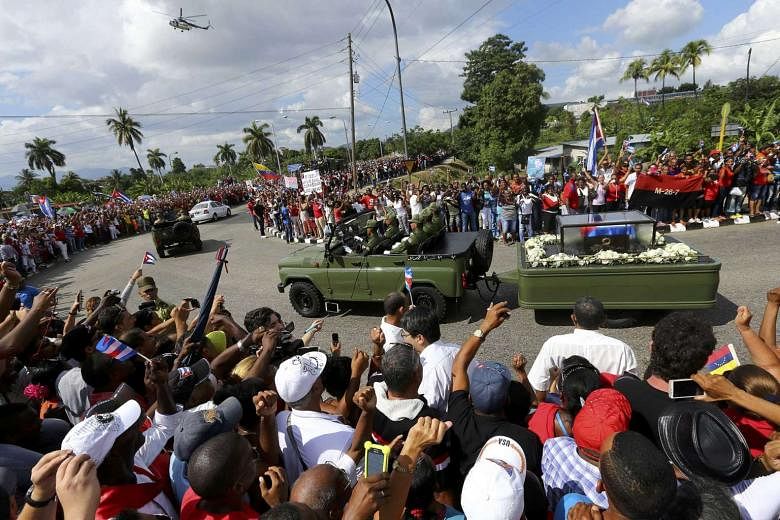SANTIAGO DE CUBA, Cuba (AFP) - The convoy carrying the ashes of Cuba's late communist leader Fidel Castro capped an island-wide journey on Saturday (Dec 3), reaching the cradle of his revolution for a big ceremony before his burial.
Massive crowds cheered as the olive-green jeep that has pulled the cedar urn with Castro's ashes across Cuba since Wednesday rolled into Santiago de Cuba.
The convoy's first stop was in Cespedes Park, in front of the same building where Castro, standing on the balcony, delivered a victory speech following his revolution's triumph in 1959.
The crowd, like others along the four-day, 900km trip from Havana, chanted "I am Fidel!" after a series of Castro speeches played on a giant screen.
President Raul Castro, who took over when his brother fell ill in 2006, will deliver a much-awaited speech during a massive tribute with foreign dignitaries in the eastern city on Saturday evening.
After a nine-day mourning period, the remains will be interred in a private ceremony on Sunday at the Santa Ifigenia cemetery, where 19th century independence hero Jose Marti is buried.
Fidel Castro's death on Nov 25 at age 90 has fueled discussions about his divisive legacy and the direction that the country may take without the omnipresent leader, who ruled for almost half a century.
Tearful supporters have cheered Fidel Castro for the free education and health care he spread in the island, while detractors call him a brutal dictator who imprisoned dissidents and ran the economy to the ground.
Children in school uniform, veterans in military fatigues and entire families waved Cuba's flags and chanted "Fidel!" as the ashes arrived in Santiago.
"He has been the father of all Cubans and all the people in need in the world," said Margarita Aguilera, the 54-year-old director of a state tobacco company who painted the words "farewell, comandante" on a white stone in front of a house.
The government had already led a huge rally with two dozen foreign presidents in Havana on Tuesday, but Santiago holds a special place in Castro's life.
"This is the cradle. Everything started here," said Victor Rivera Coca, 52, a cook who came from the town of Las Tunas with his wife and three-year-old son.
On July 26, 1953, the Castro brothers launched a failed attack on the Moncada military barracks in Santiago.
While the rebels were jailed, the attack put Castro on the map and he would eventually go into exile in Mexico.
"Condemn me, it does not matter," the trained lawyer had famously said at his trial. "History will absolve me." .
Three years after the Moncada defeat, the Castro brothers and their band of bearded rebels returned to Cuba aboard a ship named Granma. On Friday, Cuba marked 60 years since the yacht landed in a southeastern beach.
The rebels fled into the Sierra Maestra mountains, launching a guerilla war that would end in triumph against US-backed dictator Fulgencio Batista on Jan 1, 1959.
Following their victory, Castro celebrated by touring the island from Santiago to Havana. This week, the "caravan of freedom" took his ashes on the reverse route.
While hundreds of thousands of people have gathered along the road to bid farewell, the government has also encouraged Cubans to sign a pledge to defend his revolution.
Dissidents, meanwhile, have kept a low profile during the commemorations, calling off regular protests, though they plan to resume their demonstrations after Fidel Castro is buried.

